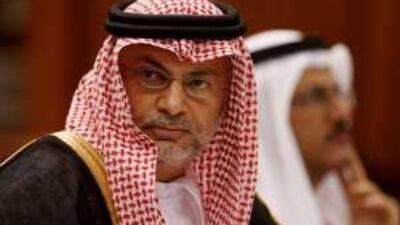DUBAI // The Government has adopted 36 out of 74 human rights recommendations made through the UN, while rejecting 30 others ahead of a planned hearing before the UN's Human Rights Council in Geneva next week. The Minister of State for Foreign and Federal National Council (FNC) Affairs, Dr Anwar Gargash, will again stand before the UN's Human Rights Council, and representatives from NGOs will be able be given an opportunity to raise issues of concern.
Among the recommendations rejected by the Government were calls to abolish the death penalty, to extend freedom of assembly and association and to grant migrant workers more rights. In an interview yesterday, Dr Gargash outlined a plan to implement the accepted recommendations. He said the human rights committee would distribute the recommendations to government bodies, and would expect updates on progress every six months.
Dr Gargash stressed that including NGOs in the process would be key to its success. "This is not a perfect society, but we value issues of human rights which we intend to tackle systematically and lift the standards of human rights," he said. "Whether it is legal changes or workshops, we will do it." After the UAE's session before the UN's top human rights body on Dec 4, 74 recommendations were submitted. Of those, 21 were rejected outright and 36 were accepted.
Yesterday, Dr Gargash said a further nine had been rejected, with eight still under consideration. "Most of the recommendations that were rejected were concerning the value system, religion and labour," Dr Gargash said. "The UAE is the optimal transitional society - very traditional, but also very modern at the same time. With this comes different expectations." Among the recommendations still under consideration is a suggestion that Emirati women married to non-citizens be allowed to pass their nationality on to their children, Dr Gargash said.
The Government is still considering whether to ratify several international treaties, including the International Convention for the Protection of All Persons from Enforced Disappearance and the International Covenants on Economic, Social and Cultural Rights and Civil and Political Rights. Also still under consideration is a Norwegian proposal to unblock websites. Among nine reccomendations rejected after some deliberation was a suggestion by Sweden that 74 recommendations were submitted f all "economic, social and cultural rights of migrant workers" be fully respected. Similarly, two issues raised by Norway to ensure freedom of expression, assembly and association and to protect human rights defenders in accordance with the Declaration on Human Rights Defenders were not adopted.
In December, the 25-member delegation led by Dr Gargash responded to more than 60 questions and comments from UN member states at the HRC. Soon after, the Government indicated that it intended to establish a human rights commission. Although he gave no timetable, Dr Gargash said that he expected it to be in place before the UAE next stands before the council in four years. "There are different models of how to approach this, but whatever model we choose has to have a high level of independence and credibility and we are very clear that we want to do this and we need it," he said.
In December, the three areas that prompted most recommendations related to labour issues, the UAE's value system and freedom of expression, Dr Gargash said. "Labour is a huge and complicated issue, but things are improving and we are addressing the demand for us to do more," he said. On the subject of allowing the formation of labour unions, he said an "acceptable formula" had yet to be found. Most of the labour-exporting countries were understanding of the UAE's efforts in the field, he said, while others were more focused on the "general picture".
"Labour [issues] will always be on our table because of our demographics," he said. "We need to learn and keep working with dynamism regarding labour." One recommendation called for the death penalty to be scrapped. "It is difficult to superimpose another value system," said Dr Gargash, adding that the death penalty was "part and parcel of our traditional and legal body". "We are not a perfect society, we are a society like any other challenged by many inequalities and issues," he said. "But, we are also fair and good I think in our approach and we want to develop. We'll never score 100 per cent, but we are working towards that."
The review came as part of a process that began last year known as the Universal Periodic Review (UPR), which will see human rights conditions in all 192 UN member states examined every four years. The 47-member council calls the process an "interactive dialogue" between each state and other UN members. In September, the UAE released its first human rights assessment. The report included inputs from organisations including the General Women's Union and the Jurists and Journalists Associations.
The UAE's review was based on three reports: the national human rights report, one compiled by UN agencies and another with contributions from organisations including Human Rights Watch, Amnesty and Mafiwasta. Three countries - Indonesia, Cameroon and Argentina - were appointed by the council to act as rapporteurs on the review process. Following the Dec 4 review, representatives from those countries liaised with the UAE delegation on which recommendations from the three-hour session would be accepted.
The Government is responsible for the implementation of the recommendations it agrees to and will be held accountable for commitments when the UAE next stands before the council in 2012. zconstantine@thenational.ae

